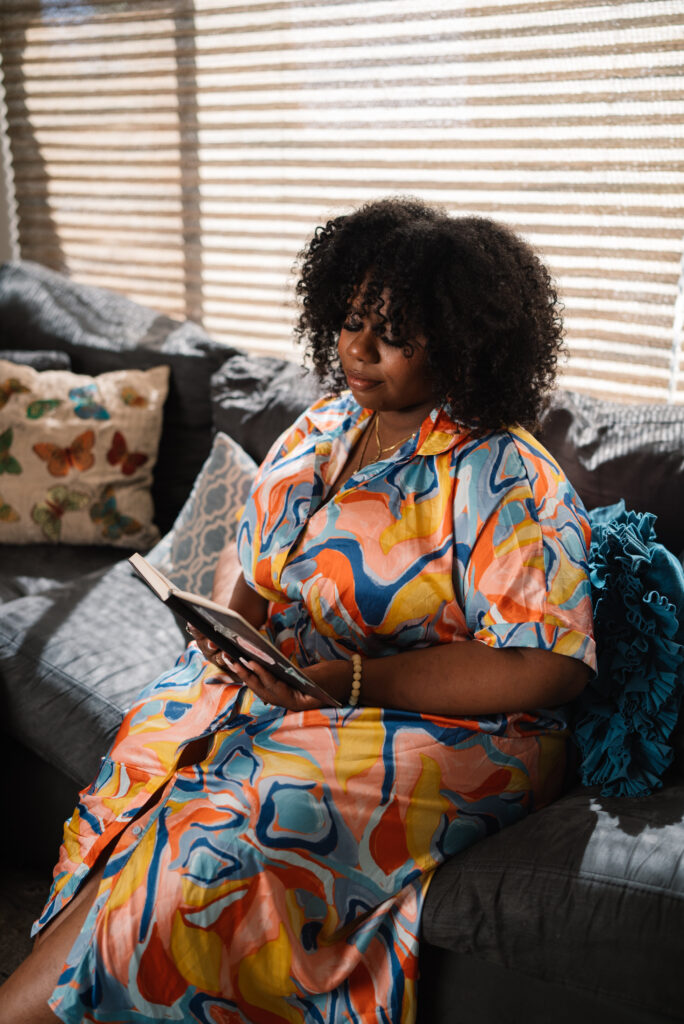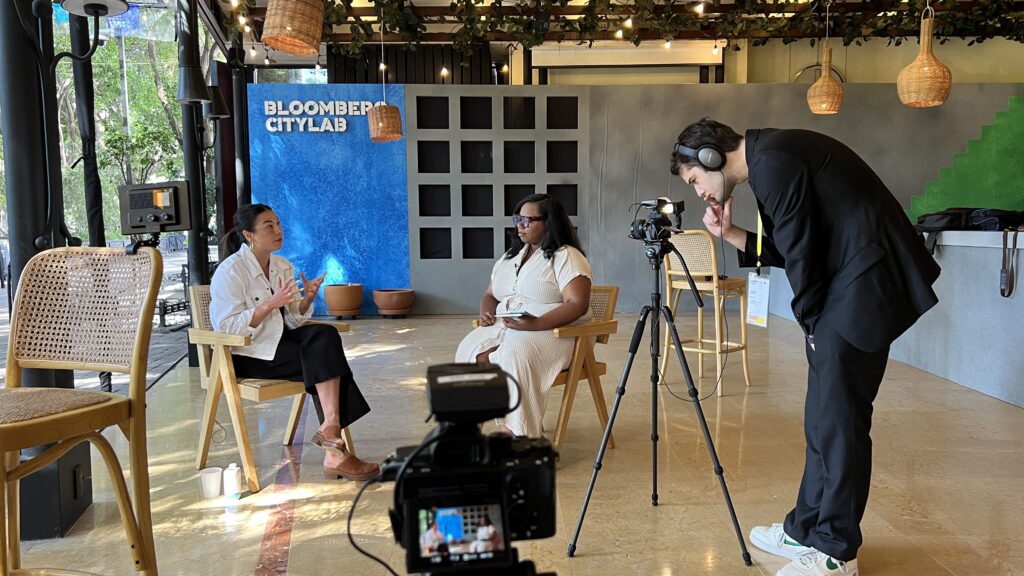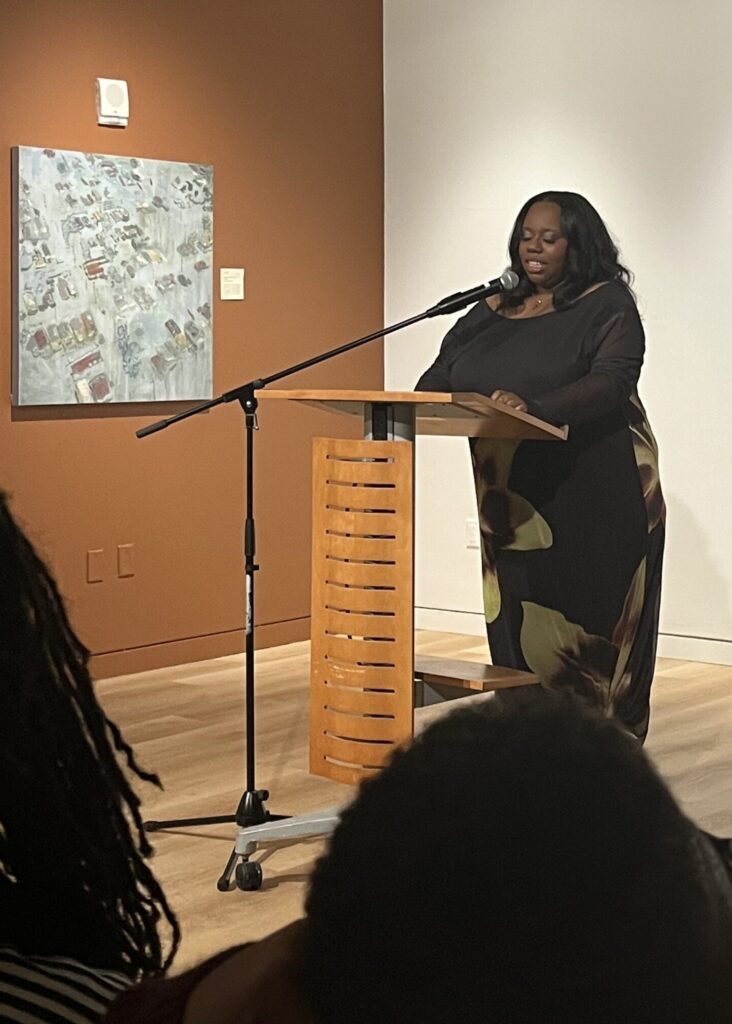Nairobi Williese Barnes: How Oakland’s Youth Poet Laureate battles division by pouring into her own identities
July 29, 2025
By: Anthony Payne
Nairobi Barnes’ life as a poet almost ended before it began. At age 11, her teacher fished a discarded poem from the trash and pushed her to submit it to a school contest. The poem wound up getting published in a book by the American Library of Poetry. It was then that Nairobi Williese, the poet, was introduced to the world.
“I was in school and I felt like ‘I’m a dork. I’m a nerd’,” she says. “But when I’m on camera, the switch is flipped. Like I’m a different person. It’s the same way with poetry for me. When I walk on stage, I’m not Nairobi Barnes. I’m Nairobi Williese.”
In 2023, Nairobi was named Oakland’s Youth Poet Laureate for the year. She now teaches at workshops, in classrooms, and is regularly booked to read her own work. Her poems often interrogate themes of identity and the layered, contradictory nature of the Black experience. Nairobi’s work draws people together in a time when many feel socially and internally fragmented.
“I think young people want to see less division”, she says. “We want to see each other hold closer in times of division.”
After earning the title of Poet Laureate, she finds it easier to be taken seriously. But there was a time when she found it harder to be respected. Her desire for a platform that valued youth perspectives led her to the Student Reporting Labs.
“When you’re younger, it’s harder to get on stage and for people to respect you, respect your art. That’s how I felt.” she recalls. “Student Reporting Labs really gave me the opportunity to voice my ideas and gain confidence in knowing that people actually do want to hear what I have to say. I definitely took what I did with Student Reporting Labs and applied it to my poetry.”
She worked on her first project with SRL as a student at Oakland Military Institute. Her class collaborated on an 80’s themed sex education video, after their teacher had to leave suddenly in the middle of the year. The students evaluated different approaches to sex ed, and polled their classmates on how they felt about their sexual education.
 Since then, Nairobi’s work has been published in Teen Vogue and on the PBS News Hour. She also recently traveled with SRL to Mexico City for the Bloomberg City Lab summit, where she interviewed Anna Martin, host of The New York Times’ Modern Love. Now a community college student who’ll soon transfer to San Francisco state, Nairobi plans to merge her artistry with journalism, seeking bigger and better methods to put words to collective feeling. Nairobi treats her interests as a compass; when she feels a spark she feeds it, recognizing inspiration as a rare thing in today’s attention economy. She encourages those who feel trepidation to do the same.
Since then, Nairobi’s work has been published in Teen Vogue and on the PBS News Hour. She also recently traveled with SRL to Mexico City for the Bloomberg City Lab summit, where she interviewed Anna Martin, host of The New York Times’ Modern Love. Now a community college student who’ll soon transfer to San Francisco state, Nairobi plans to merge her artistry with journalism, seeking bigger and better methods to put words to collective feeling. Nairobi treats her interests as a compass; when she feels a spark she feeds it, recognizing inspiration as a rare thing in today’s attention economy. She encourages those who feel trepidation to do the same.
“If you have interests and you’re very fascinated in them, learnabout them, be involved in them” Nairobi asserts. “I think a lot of young people need to know that your interests can make money. It doesn’t have to be one or the other.”
Nairobi’s mother often guided her to “always have multiple streams, not just one riverbank.” She finds that her varied interests don’t subtract time from each other, rather the opposite: the chances that she’s taken in poetry have opened doors for her in journalism, and vice-versa.
“Make sure you take care of the riverbank,” Nairobi advises. “Make sure you’re checking on your mental health and taking breaks. Learn when to shut off and when to work, when to rest and when to go for it, because there are times that the river needs to lie still and times the river needs to be rushing.”
One way Nairobi tends to her riverbank is unplugging. She’s able to find more common ground with others face-to-face than online. She emphasizes balance between screen time, the news cycle, and real life. Nairobi is thankful for public media’s role in teaching her to be receptive and informed, and feels strongly about its place as a vehicle for knowledge and community:
“I really respect all of our journalists out here who are doing the work and getting the information that we need, the real stuff.” she says. We remember the influence and impact that these stations have had on us. It’s because of public television that I was able to learn and become a well-adjusted person in adulthood. So it’s very interesting to me that people in power are trying to push this narrative. Most of us can see right through the smoke and mirrors. We will fight for our funding and our education and our networks because we see the value that they bring not only to children, but to us as people and adults in our communities.”
In a time when many feel distracted, lonely or jaded, Nairobi urges people to be social, not parasocial. Meeting people at bookings and workshops makes her feel grounded, like she’s part of a unit.
“Always just remember that a screen is not something that can talk back to you in real time. A real person can do that, and it’s better that way.”






